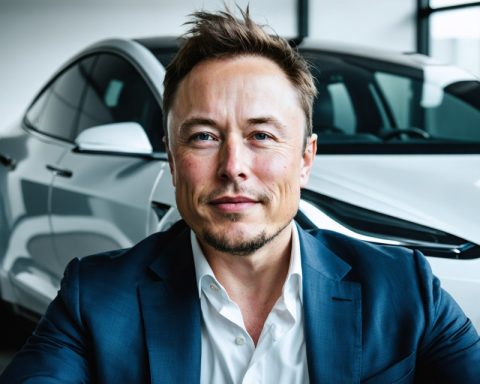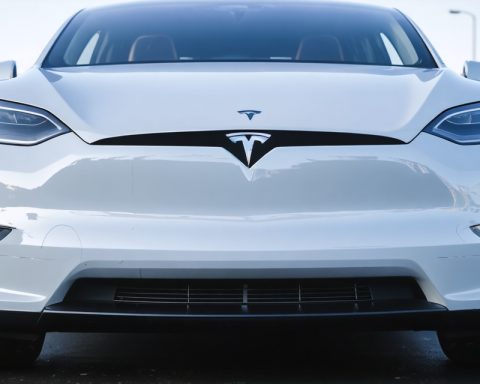- Elon Musk’s net worth has experienced a significant $100 billion decrease, largely due to Tesla’s struggling performance.
- Tesla’s shares have dropped by nearly 20% this year, affecting market perceptions and confidence.
- In Europe, Tesla registrations fell 45% in January, contrasting with the region’s strong electric vehicle market growth.
- Chinese interest in Tesla appears to be waning, potentially influenced by Musk’s political associations.
- Despite these setbacks, Tesla’s stock remains up 52% over the past year, suggesting some investor optimism.
- Musk’s ventures, such as SpaceX and Neuralink, continue to captivate interest, and new technologies like robo-taxis may alter Tesla’s fortunes.
- Uncertainty looms as investors debate whether Tesla’s recent troubles hint at bigger issues or are merely temporary setbacks.
Elon Musk, a name synonymous with innovation and intrigue, finds his towering net worth bruised. A hefty $100 billion slip since December marks a turbulent chapter for Tesla. The electric automaker has seen its shares spiral, shearing off nearly 20% this year alone. Such seismic shifts are rattling markets and sparking whispers of a Tesla tumble.
In Europe, the once-ascendant Tesla finds itself in reverse. Registrations nosedived by 45% this January, a stark contrast to the continent’s buoyant battery-electric vehicle market. Meanwhile, whispers from the East hint at a cooling passion for Teslas in China. Some analysts speculate that Musk’s boisterous political entanglements, particularly his alliances with the Trump administration, are cooling European appetites for his brand.
But the bigger picture remains complicated. Despite recent stumbles, Tesla stock still boasts a robust 52% gain over the past year. Some investors theorize that stockholders are merely capitalizing on previous windfalls.
Musk juggles many high-profile ventures, including SpaceX and the brain-chip maven Neuralink. His presence continues to inspire a unique blend of awe and skepticism among investors. With potential robo-taxis on the horizon and full-self-driving technology revving up in China, some believe Tesla’s dip may be a fleeting fluke rather than a full stop.
Yet, the road ahead remains uncertain. Investors hold their breath, questioning whether Musk’s tantalizing blend of charisma and controversy will steer Tesla back to upper echelons or if the recent $100 billion hiccup signals deeper shifts in the automaker’s trajectory. One thing remains clear: when Musk plays his cards, the world watches.
Is Tesla’s Bumpy Ride a Temporary Setback or a New Normal?
Market Forecasts & Industry Trends
The electric vehicle (EV) market continues to expand globally, with Tesla being a key player. However, Tesla’s recent struggles highlight the nuanced competitive landscape. In Europe, competition from companies like Volkswagen, Audi, and Renault is intensifying, as these companies ramp up their EV production and appeal to local markets with established brand loyalty. According to data from the European Automobile Manufacturers Association (ACEA), EV sales are growing significantly, with Tesla’s market share shrinking as rivals grow.
The Asian market, particularly China, is another battleground for Tesla. Chinese manufacturers like BYD and NIO are not only increasing their production capacities but also offering competitive pricing, which puts pressure on Tesla’s margins. The Chinese government’s emphasis on local production and innovation further benefits domestic brands.
Real-World Use Cases
Tesla’s vehicles are recognized for their advanced technology, especially in the realm of autonomous driving. In the United States, Tesla’s full self-driving (FSD) software continues to be a point of fascination and scrutiny. In real-world applications, FSD is being tested in complex urban settings to fine-tune its capabilities, although it is yet to achieve complete autonomy. This technology is pivotal as it has the potential to revolutionize urban mobility and logistics by reducing traffic accidents and increasing efficiency.
Reviews & Comparisons
Tesla’s brand image is both a blessing and a curse. Customer reviews often laud Tesla’s cutting-edge technology and performance but criticize its build quality and service infrastructure. Competing brands are narrowing the technology gap while often providing superior customer service and perceived value. For instance, Audi and BMW are delivering EVs with high-end finishes and integrated tech that challenge Tesla’s offerings.
Pros & Cons Overview
Pros:
– Advanced technology and innovation.
– Strong brand recognition and loyalty among tech enthusiasts.
– Continuous evolution with software updates and new models.
Cons:
– Quality control issues and customer service shortcomings.
– Increasing competition from established and emerging brands.
– Political controversies affecting the brand perception.
Controversies & Limitations
Elon Musk’s political involvement has been controversial and may have implications beyond public relations. His associations could potentially influence consumer attitude in politically sensitive markets. Additionally, Tesla has faced scrutiny over labor practices and environmental impacts of its manufacturing processes, making sustainability and labor relations areas for improvement.
Actionable Recommendations
1. Research Competitors: Given the rising competition, prospective EV buyers should compare multiple brands based on key factors like range, price, and features.
2. Stay Updated: Follow market trends and Tesla’s financial health, as fluctuations could impact investments or purchase decisions.
3. Monitor Technological Advancements: Keep an eye on developments in autonomous driving and battery technology, as these could significantly influence the future of EVs.
4. Climate Concerns: Evaluate an automaker’s sustainability track record and commitments, as these can affect long-term brand viability.
For more information on emerging automotive technologies and industry news, visit Tesla or ACEA.









